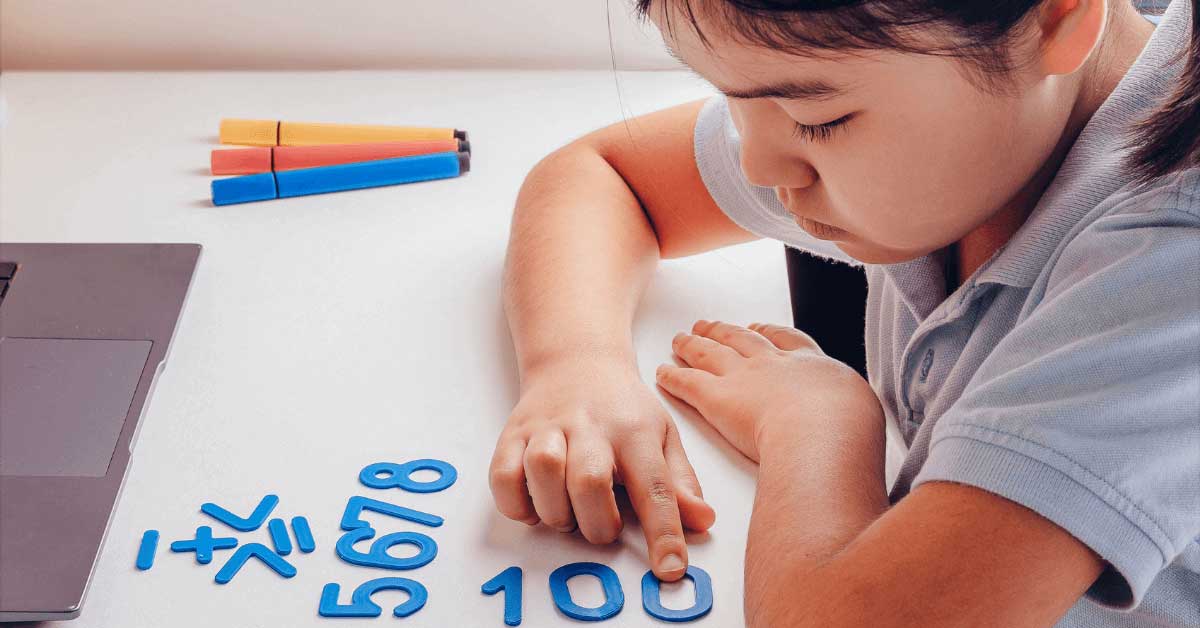
Math anxiety is much more than just a distaste or dislike of the subject. It is a very real problem that many students face. In fact, math anxiety causes so much mental distress in students that it blocks the brain’s working memory and encourages a self-fulfilling cycle of hatred of studies, acceptance to low achievement and general fear of studying.
It is said that this form of anxiety can manifest in children as early as kindergarten. It is so common that nearly half of elementary school children have experienced it by the 6th grade. Some children are able to shrug this anxiety off better than others, but for those who are unfortunate to be trapped into this cycle might bring this anxiety into their adulthood, gradually this math anxiety becomes worse and starts bleeding into different aspects of their lives, manifesting into social anxiety and self-doubt.
Any parent would be worried if their child is silently suffering like this, and would help out in any way they can. The first step to helping your children is by identifying the early signs and symptoms and solving the problem from there.
Here are the signs and symptoms of math anxiety that you should look out for in your child.
1. Avoidance
Math anxiety and math avoidance go hand in hand. Does your child seem to grasp at any reason to leave the house or procrastinate whenever they are trying to do their math homework? This could be more than just your children trying to get out of work. Kids with high levels of math anxiety tend to avoid mathematics at all costs.
Usually, your kids might even act up, or do chores, or even come up with excuses to you. Avoidance of math might be hard to recognize because your kids might not even be aware of it themselves, or are unable to tell you what they are feeling about math.
2. Lack of response
Do you notice your kids sometimes start to freeze up or stare blankly into space when they are doing their math questions? This might be a symptom of math anxiety. When kids are suffering from math anxiety, any math related question can make them extremely stressed, shoot their cortisol levels up and cloud their judgment.
In cases like this, they lack full access to their working memory, making it nearly impossible for them to think clearly. They may even have this reaction when they know the answer—it’s the fear that is standing in the way, not the math.
Related: How to help your teenager who’s struggling with anxiety?
3. Becoming overly emotional, usually tears or anger.
Tears or anger might signal anxiety, especially if they appear only during math. Kids with math anxiety tend to be very hard on themselves and work under the harmful and false assumption that being good at math means getting correct answers quickly. These beliefs and thoughts are quite negative to their self-esteem and future growth.
4. Negative self-talk
Children who suffer from math anxiety always have negative thoughts about the subject and their own abilities. Much of this self-doubt and harsh ideas may only happen in their head, making it incredibly difficult to catch on. However, your kids might share these thoughts out loud with you without even realizing it in a very negative way.
For example, have you ever heard your children say things like “I hate math. I’m not good at this. I hate myself. Why do I have to do this? I’m useless.” When there is a lot of negative self-talk that happens when they are doing their math homework, it is a very strong telltale sign that you might have to step in and do something as it is a cry for help.
Related: How to make school fun for kids
5. Low achievement
Given that children that have math anxiety naturally try to avoid math, it is not surprising that this also affects their overall educational achievements. With less exposure to math than their peers, these students tend to do poorly on assignments and assessments. And students begin to see low grades as labels that verify their belief that they just can’t do math. This creates a dangerous cycle where they keep telling themselves they cannot do it, so they do not do it, and it becomes a self-fulfilling prophecy.
Doing your duties as a good parent
If your children display one or more of these symptoms when they are doing their math homework, you should do your best as a parent to guide them along the right path. The best thing to do is to sit down with them and talk about it, have a heart to heart and see what can be done for them. Encourage them and let them know that they are incredibly talented individuals but they need help, and you are here to help them through whatever difficulty they are going through.
Sometimes, one on one tutoring can be the solution to your child’s fear of math. Tutors can provide mentorship and ease anxiety by working with students to tailor their teaching methods to each student’s needs.
Learn more about tutoring options at School is Easy by contacting your closest location.




